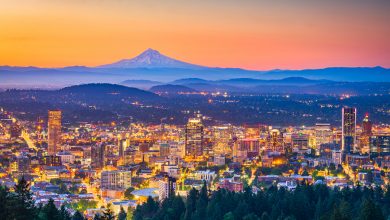Balancing act: What Seattle Mayor Jenny Durkan’s short tenure says about running a tech hub
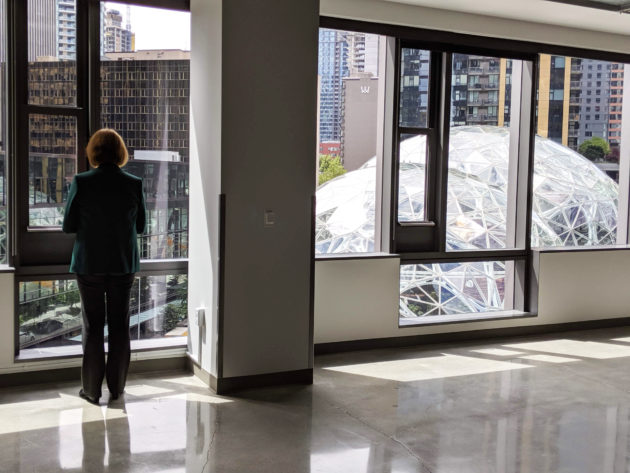
Seattle Mayor Jenny Durkan sought to build a bridge between the tech industry and its harshest critics in the divided city during her first term. In a one-week tech blitz last year, Durkan paid visits to Amazon, Expedia, and Apple’s downtown campuses to celebrate the rapid growth of the tech sector. She also invited top tech companies to build municipal products and advise the city.
But Durkan, who announced last week that she will not seek a second term, made few friends in her attempts to balance Seattle’s competing ideological branches.
The Seattle business community threw its influence and financial weight behind Durkan during her candidacy, helping her soar to victory in 2017 with 56% of the vote. Despite that support, Durkan did not emerge as the business-friendly ally at City Hall that many expected, some community leaders told GeekWire in interviews for this story. But others said she did her best to create a welcoming environment for business in the face of difficult obstacles.
Seattle’s progressive wing is more dubious. Activists and labor leaders have long viewed Durkan as too cozy with big business. They criticize her for failing to provide a stronger check on the influence wielded by Seattle’s booming technology industry.
The reality is likely somewhere in the middle. But in her attempt to thread the needle between Seattle’s competing forces, Durkan ended up with critics across the ideological spectrum. Balancing the goals of progressives who gravitate toward booming cities and the businesses that make them prosperous is a tall order.

“Mayor Durkan made a real effort to harness the tech industry to help government,” said Heather Redman, co-founder of Seattle venture capital firm Flying Fish Partners who is engaged in civic and policy sectors. “However, given the political climate, I don’t think that she felt she could robustly partner with any aspect of the business community, especially tech, and still work with the City Council.”
Though she made no mention of tech in her departure announcement, Durkan’s decision not to seek a second term, after initially signaling she would run for re-election, shows just how difficult it has become to run a big tech hub.
It’s a story that continues to play out in Seattle, San Francisco, New York, and other cities where the vast majority of residents vote blue but divisions still dominate the political landscape. The divide separates business-friendly moderates who fear world-class tech hubs could lose their edge if policy swings too far left, and liberal progressives who would like the cities to become test beds for social justice causes.
Taxing the tech industry
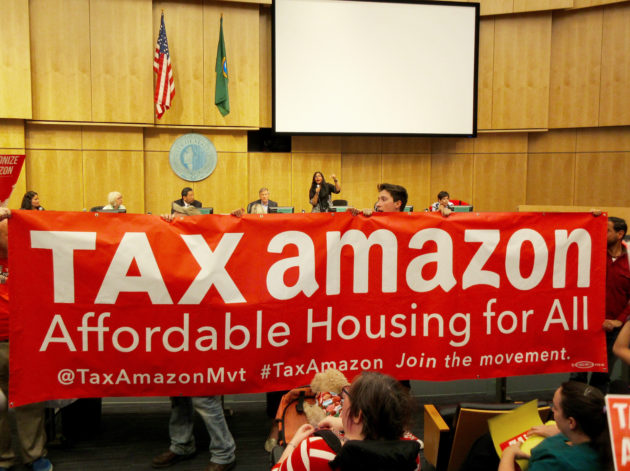
Durkan’s tenure is bookended by the contentious debate over taxing big business, including large tech employers. Her first months in office were bogged down by the City Council’s “head tax” on Seattle’s top grossing businesses.
Durkan, who did not respond to a request for an interview for this story, initially signed off on the tax after the City Council unanimously approved the legislation. A few weeks later, the council and mayor repealed the controversial tax when faced with a protracted battle with Amazon, other employers, and Seattle’s business-friendly wing.
The head tax ordeal soured many Seattleites on new business taxes. It was two years before the City Council took up the issue again. But this summer, the city passed a new payroll tax on the top salaries at Seattle companies with annual payroll expenses of $7 million or higher. The tax is expected to generate $200 million annually to fund relief for families during the pandemic and alleviate Seattle’s homelessness crisis.
Durkan opposed the tax and did not sign the legislation but it became law by a supermajority vote of the council. Last week, the Seattle Metropolitan Chamber of Commerce filed a lawsuit challenging the new tax.
“Durkan, to a degree, got trapped between the interests of the Amazon leadership and the interest of Amazon employees,” said former Seattle mayor Mike McGinn. “The leadership obviously had very strong opinions about taxes in Seattle, spent so much money in the last City Council cycle, but a lot of the employees and the young people that come to work at Amazon, they have an interest in a different type of city than the interests of their bosses.”
A friend to labor or business?
Unlike the business taxes that the City Council championed, Durkan’s administration was the driving force behind an effort to establish labor standards for gig workers helping shuttle people around as Uber drivers or delivering groceries for Instacart. Durkan spearheaded legislation to establish a minimum wage for Uber and Lyft drivers and tax companies that operate transportation networks in the city. The “Fare Share” program had support from Seattle labor unions. Durkan also pushed through a cap on the fees that services such as UberEats charge restaurants in an effort to mitigate the financial hardship the food industry faces during the pandemic.
Despite those programs, Seattle’s progressive wing largely views Durkan as a centrist ally to big business.
“The gig workers legislation aside, [consider] whether or not there were any real material gains for working people over the last three years or whether or not we continue to backslide into making Seattle a more exclusive, cost prohibitive city,” said Shaun Scott, a social justice activist and former City Council candidate.
Durkan attempted to build a bridge between City Hall and the tech industry in the wake of the head tax ordeal. In 2018, she created the city’s first Innovation Advisory Council, tapping companies such as Amazon, Zillow, and Expedia to build technology products to solve municipal challenges. A year later, the city unveiled seven projects built by the IAC, including a housing affordability portal, homeless service technologies, and an early earthquake warning system.
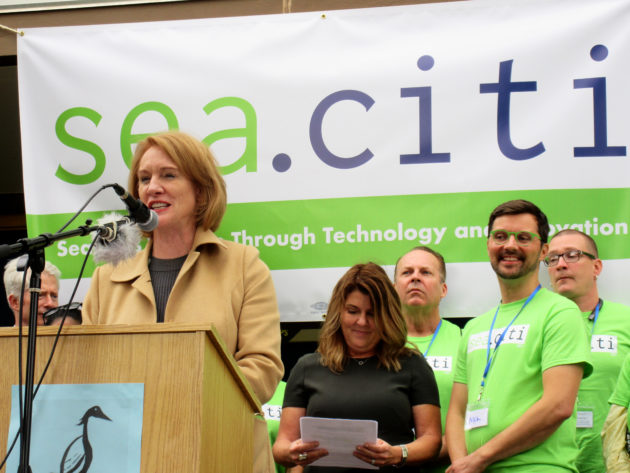
The IAC received criticism from progressives who questioned Durkan’s decision to give the tech industry special access to city officials. But Durkan’s team defended the IAC as an innovative way to leverage the tech talent in Seattle to improve government processes.
“A mayor needs to work with lots of different stakeholders so we appreciate that she has been intentional about including business in that,” said Alicia Teel, a spokesperson for the Seattle Chamber.
A few weeks after launching IAC, some of the biggest tech companies in Seattle launched a new group called sea.citi to connect their employees with civic life. Durkan spoke at the launch event.
Durkan also asked the Washington Technology Industry Association to help recruit a new chief technology officer for the city, according to WTIA CEO Michael Schutzler. Durkan ultimately selected Saad Bashir, former chief information officer for the City of Ottawa, to run the city’s IT department. Schutzler said he was “impressed” with the process and thinks it’s the first time the city asked industry representatives for help to hire a tech leader.
But Schutzler wished Durkan had been more actively engaged in making tech more inclusive, through initiatives such as Apprenti, the WTIA’s tech apprenticeship program.
“The biggest missed opportunity in my view is the city never engaged in workforce development,” he said. “We have had great partnerships in other cities across the country, but her staff never was willing to explore how we set up something in Seattle to help women and people of color get access to tech jobs through apprenticeships.”
Tech hub turmoil
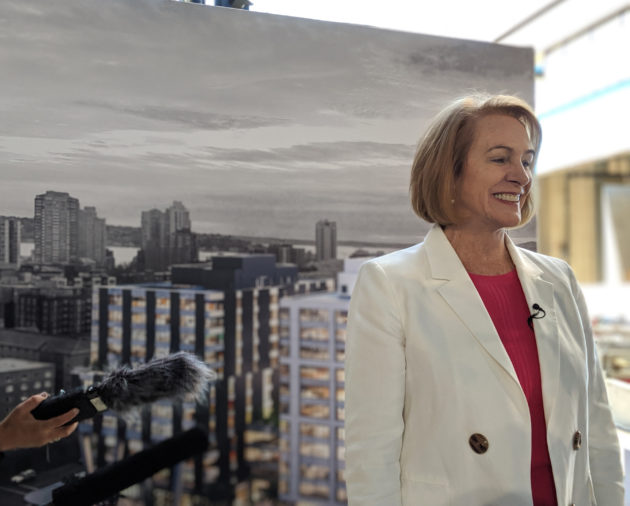
Shortly after Durkan became the first openly lesbian woman to lead Seattle, San Francisco elected London Breed as the first black woman mayor of its city. The two share more in common than trailblazing.
After Amazon faced off with the Seattle City Council over the head tax, San Francisco progressives sought a different approach to taxing the giant tech companies that have transformed their city. They put a new revenue tax on companies with more than $50 million in gross annual receipts to the voters with a 2018 ballot measure called Proposition C.
Much like Durkan, Breed opposed the plan, and like Seattle’s head tax, a wonky local proposal attracted national attention when the tech industry got involved. Salesforce CEO Marc Benioff was a vocal supporter of Prop C, and had a public debate online with Square and Twitter CEO Jack Dorsey over his opposition to the proposal. Dorsey said that he supported Breed’s alternative approach to addressing San Francisco’s homelessness crisis. But unlike the head tax, Prop C became law and a court victory in September will free up the funds raised through the tax for homelessness services.
Both Breed and Durkan are viewed as centrist-leaning politicians in one-party cities. Both have held the executive office while their cities experimented with novel business taxes designed to capture some of the wealth generated by tech. Seattle and San Francisco are home to some of the largest and most powerful technology companies in the world, and both cities are grappling with deep inequity and challenges associated with their tech booms.
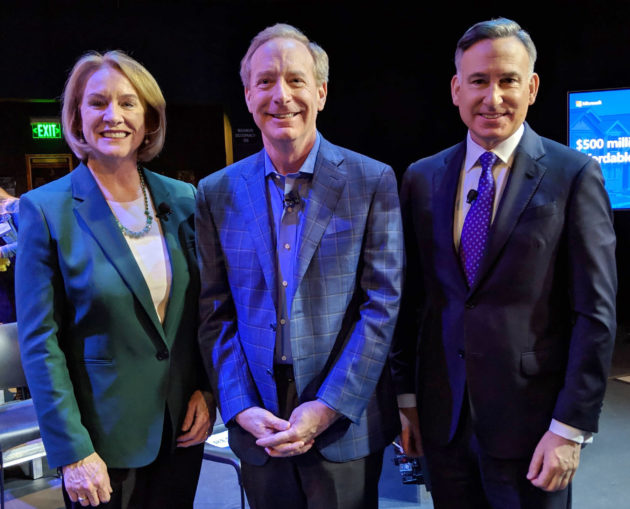
But Durkan has fielded more staunch opposition from her critics in recent months than Breed has. The anti-Durkan camp went as far as a launching recall campaign until the Washington State Supreme Court tossed out the effort in October.
Support for the two mayors diverged during the Black Lives Matter protests over the summer. Durkan took heat for her police department’s use of force against protestors, while Breed gained support across the ideological spectrum for a proposal to reinvest funding from police to the Black community, SF Weekly reports.
In New York, the nation’s other major tech hub, the comparison is complicated by factors unique to the metropolis. Tech is one of several major industries in New York, where managing the coronavirus crisis has eclipsed most other issues over the past year. But in a parallel to Durkan’s tenure, the business community has criticized New York Mayor Bill de Blasio for failing to form more meaningful partnerships with the private sector.
Taken together, it’s clear that running a booming, progressive tech hub is a difficult job in which allies are tough to keep. Cities like Seattle, San Francisco, and New York have become testing grounds for some of the most progressive economic policies in the nation. At the same time, the prosperity of those cities hinges on the success of their top employers, many of which could suffer under policies designed to balance the scales of economic justice.
Redman, the Seattle venture capitalist, said it was “sad” that Durkan couldn’t both partner with the local business community and also work with the council.
“It is sad because the only way forward in our region is together — government, business, education, activists all working together (with some raised voices at times) to solve the region’s problems and provide an equitable future for all,” she said.
The challenges are likely to become even more acute as the long-term consequences of 2020’s telecommuting experiment play out. Many companies have signaled they will move or dramatically reduce their presence in expensive tech cities now that they’ve adjusted to remote work. The forecast for urban cores such as downtown Seattle is particularly grim. The neighborhood has been roiled by COVID-related business closures, incidents of violence, and property damage over the past year causing concern for employers.
That is the complex and dynamic situation that Seattle’s next mayor will inherit and, perhaps, it is one reason Durkan chose not to sign up for the job.
Conclusion: So above is the Balancing act: What Seattle Mayor Jenny Durkan’s short tenure says about running a tech hub article. Hopefully with this article you can help you in life, always follow and read our good articles on the website: Ngoinhanho101.com



